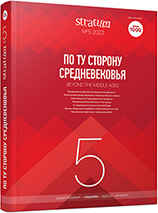«Бактериологическая атака» 1346 года в Каффе и магические практики средневековых кочевников
“Bacteriological Attack” of 1346 in Kaffa and Magical Practices of Medieval Nomads
Author(s): Artem A. PorsinSubject(s): History, Military history, Middle Ages, Health and medicine and law, 13th to 14th Centuries
Published by: Издательский дом Stratum, Университет «Высшая антропологическая школа»
Keywords: Kaffa; plague; epidemic; bacteriological weapon; magic;
Summary/Abstract: Gabriel de Mussy’s report, apparently recorded from the words of eyewitnesses of the event, is a convincing description of one of the first facts in human history of the use of “bacteriological weapons”. Allegedly, during the siege of the Crimean city of Kaffa by the Golden Horde troops of Khan Dzhanibek, a plague epidemic broke out among the soldiers. Then the besiegers began to throw the bodies of the dead into the city with the help of stone throwers, after which the epidemic broke out there as well. Many of the townspeople fled on ships and arrived in Italy by sea, thus bringing the disease to Europe. De Mussy’s report is criticized or accepted by different authors with a different set of arguments, but both points of view are built on the basis of the assumption that the nomads bombarded the city with corpses and tried to spread an epidemic to it in order to facilitate the assault. However, de Mussy’s text directly says that this action was a gesture of desperation and was carried out after the Mongols had lost interest in the siege. The article compares the actions of the Golden Horde army in 1346 in Kaffa with the practices that, according to Russian and Polish sources, were used by nomads in Southwestern Russia during the campaign against Poland in 1287—1288, when there was also an epidemic. This comparison, in the context of accounts on how the Mongols of the imperial period understood the manifestation of a deadly infectious disease, allows to conclude that, perhaps, the practices recorded by de Mussy had a magical, rather than a rational meaning.
Journal: Stratum plus. Археология и культурная антропология
- Issue Year: 2022
- Issue No: 5
- Page Range: 99-107
- Page Count: 9
- Language: Russian
- Content File-PDF

